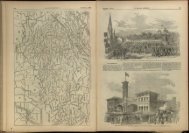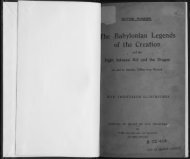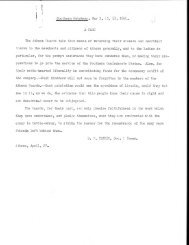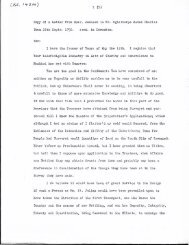THE SHE KING; OR, THE BOOK OF ANCIENT POETRY
THE SHE KING; OR, THE BOOK OF ANCIENT POETRY
THE SHE KING; OR, THE BOOK OF ANCIENT POETRY
Create successful ePaper yourself
Turn your PDF publications into a flip-book with our unique Google optimized e-Paper software.
52 <strong>THE</strong> CHINA <strong>OF</strong> <strong>THE</strong> <strong>BOOK</strong> <strong>OF</strong> POETET.<br />
to sacrifices offered to some one monarch. They<br />
would be celebrated on particular occasions connected<br />
with his achievements in the past, or when it was sup<br />
posed that his help would be specially valuable in con<br />
templated enterprises.<br />
There were also other services performed in the temple<br />
of ancestors which were of less frequent occurrence, and<br />
all known by the name of te. That term was applied in<br />
a restricted sense to the annual sacrifice of the summer<br />
season; but there were also " the fortunate te," when<br />
the Spirit-tablet of a deceased monarch was solemnly<br />
set up in its proper place in the temple, 25 months after<br />
his death; and " the great te," called also licah, cele<br />
brated once in five years, when all the ancestors of the<br />
royal House were sacrificed to, beginning with the<br />
mythical emperor Kuh, to whom their lineage was traced.<br />
There is no description in the She of the ceremonies used<br />
on those occasions.<br />
With regard to all the ceremonies of the ancestral<br />
temple, Confucius gives the following account of them<br />
and the purposes they were intended to serve in the<br />
Doctrine of the Mean, ch. XIX. 4 :—" By means of them<br />
they distinguished the royal kindred according to their<br />
order of descent. By arranging those present according<br />
to their rank, they distinguished the more noble and the<br />
less. By the apportioning of duties at them, they made<br />
a distinction of talents and worth. In the ceremony of<br />
general pledging, the inferiors presente'd the cup to their<br />
superiors, and thus something was given to the lowest to<br />
do. At the [concluding] feast, places were given ac<br />
cording to the hair, and thus was marked the distinction<br />
of years."<br />
5. The habits and manners of the ancient Chinese<br />
Manners and generally, as they may be learned from the<br />
CM tener"- She, will be found set forth in a variety of<br />
al'y- particulars in an essay by M. Bdouard Biot,<br />
whose early death was a great calamity to the- cause of<br />
Chinese study. It appeared in the Journal Asiatique<br />
for November and December, 1843. It was not possible<br />
for him in his circumstances, and depending so much as<br />
he did on Lacharme's translation of the odes, to avoid<br />
falling into some mistakes. The pioneers in a field of<br />
<strong>THE</strong> CHINA <strong>OF</strong> <strong>THE</strong> <strong>BOOK</strong> <strong>OF</strong> POETET. 53<br />
literature so extensive as the Chinese could not but fall<br />
into many devious tracks. It is only by degrees that<br />
Sinologues are attaining to the proper accuracy in their<br />
representations of the subjects which they take in hand.<br />
On two or three points I subjoin some additional observ<br />
ations.<br />
i. That filial piety or duty is the first of all virtues is<br />
a well-known principle of Chinese moralists; and at the<br />
foundation of a well-ordered social State they place the<br />
right regulation of the relation between husband and<br />
wife. Pages might be filled with admirable sentiments<br />
from them on this subject; but nowhere does a funda<br />
mental vice of the family and social constitution of the<br />
nation appear more strikingly than in the She. In the<br />
earliest pieces of it, as well as in the latest, The low status<br />
we have abundant evidence of the low status of woman, and<br />
which was theoretically accorded to woman, poygamy-<br />
and of the practice of polygamy. Biot has referred to<br />
the evidence furnished by the last two stanzas of II. iv.<br />
VI. of the different way in which the birth of sons and<br />
that of daughters was received in a family. The family<br />
there, indeed, is the royal family, but the king to whom<br />
the ode is believed to refer was one of excellent<br />
character; and the theory of China is that the lower<br />
classes are always conformed to the example of those<br />
above them. The sentiments expressed in that ode are<br />
those of every class of the Chinese, ancient and modem.<br />
\Vhile the young princes would be splendidly dressed<br />
and put to sleep on couches, the ground to sleep on and<br />
coarse wrappers suffice for the princesses. The former<br />
would have sceptres to play with; the latter only tiles.<br />
The former would be-—one of them the future king, the<br />
others the princes of the land; the latter would go<br />
beyond their province if they did wrong or if they did<br />
right, all their work being confined to the kitchen and<br />
the temple, and to causing no sorrow to their parents.<br />
The line which says that it was for daughters neither to<br />
do wrong nor to do good was translated by Dr Morrison<br />
as if it said that "woman was incapable of good or<br />
evil; " but he subjoins from a commentary the correct<br />
meaning,—that " a slavish submission is woman's duty<br />
and her highest praise." She ought not to originate








